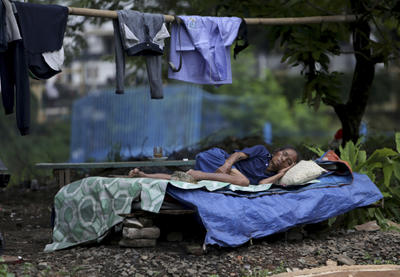The gulf between rich and poor has widened in Indonesia by as much as 60 per cent over the last decade — more than in any other developing country. While the rich get richer, around 40 per cent of the country’s 250 million people still live on under US$2 per day.
The last ten years in Indonesia, following the departure of Suharto and the Asian financial crisis in 1997–98, has seen dramatic change. Across Asia there has been rapid growth but this hasn’t trickled down to the region’s most impoverished people as much as one would hope — and Indonesia is a case in point. The country’s economy has boomed since the 2000s, but this has benefited the rich more than the poor. The dramatic rise in inequality is even more spectacular when you consider that for many developing countries in Latin America, inequality is on the decline.
So, what’s the cause of Indonesia’s rising inequality? Recent economic growth has been fuelled by a commodity boom — as world prices have increased, there’s been a rise in exports such as coal and palm oil. Natural resource production demands capital investment, hence the commodity boom generally benefits the already rich.
Some argue that a burgeoning gap between rich and poor can be attributed to rapid development of Indonesia’s urban areas, such as the capital, Jakarta. But inequality has risen across the country, and much of the increase is within provinces and districts.
Calculating a range of measures of inequality and considering, for example, the difference in what the richest and poorest in Indonesian society spent from 2003–2013 — or the ratio of expenditure between the richest 10 per cent and the poorest 10 per cent — there was an increase in inequality of over 60 per cent. Standard measures of inequality, such as the Gini coefficient, also found a rise in inequality of more than 30 per cent during the same period.
At the same time, Indonesia’s use of fiscal policy to address rising inequality during the last decade of economic growth has not been effective.
For instance, last year personal income tax contributed around Rp102 trillion (US$9 billion) to the country’s national budget. In contrast, fuel subsidies came to Rp200 trillion (US$17 billion) — a tax break enjoyed by the richest 40 per cent. Meanwhile, social spending was just over Rp80 trillion (US$7 billion).
What could new president Jokowi do in his first 100 days in office to address such issues? A more progressive budget to tackle inequality is possible by channelling the fuel subsidy towards social spending.
There is good reason to have hope in the new president. Jokowi’s election win comes from his track record of innovative health and education policies as mayor of Solo and governor of Jakarta.
For instance, last year his Jakarta Smart Card initiative targeted more than 300,000 students from poor families at a cost of Rp800 billion (US$68 million). It meant that a typical poor family of two young children in school received vouchers of Rp360,000 (US$31) per month — about a quarter of their household budget. The vouchers must be spent on education (getting the bus to school, books, uniform and so on). Evidence suggests that this policy alone could cut rising inequality in Jakarta by half.
Jokowi’s promise to expand the Jakarta Smart Card program nationwide has appealed to the millions of Indonesians voting for him.
Indonesia can certainly afford to help its poorest. And, if the new president wants economic growth to continue, he must tackle the growing gap between rich and poor. Research shows that rising inequality not only prolongs poverty but also slows economic growth. Let’s hope the new president lives up to expectations and is able to continue with his progressive track record.
Dr Arief Anshory Yusuf is the Director of the Centre for Economics and Development Studies, Padjadjaran University, Indonesia.
Dr Andy Sumner is the Director of the King’s College London International Development Institute.
The article is based upon a research paper published in the August issue of the Bulletin of Indonesian Economic Studies. A version of this article was first published here on Al Jazeera.


It is unfortunate that these authors ask what Jokowi could do in his first hundred days. Yudhoyono came to office in 2004 determined to do something in his first hundred days, and set his ministers the task of dreaming up programs for that initial, arbitrary-selected period. This gimmick was more or less a complete failure, and yet Yudhoyono repeated the error on his re-election in 2009.
Jokowi has already shown a liking for ill-thought-out but trendy ideas, such as calling on the public to help nominate cabinet ministers. He shouldn’t be encouraged to toy with 100-day programs as well.
A Smart Card solution claiming “this policy alone could cut rising inequality in Jakarta by half ”is appealing; but, don’t see how Jokowi can offer hope for the poor with corruption increasing.
Corruption will certainly affect the Smart Card, though perhaps the least of neoliberalism (economic liberalization, privatization, free trade, open markets, deregulation) policy suggestions for government.
Still, this article flogs a particular of the apparent dead horse of neoliberalism that has based neoclassical economics & professed perceptions of progress since Pinochet’s economic reforms in Chile.
If Piketty’s ‘r > g’ is valid Neoliberalism is dead!